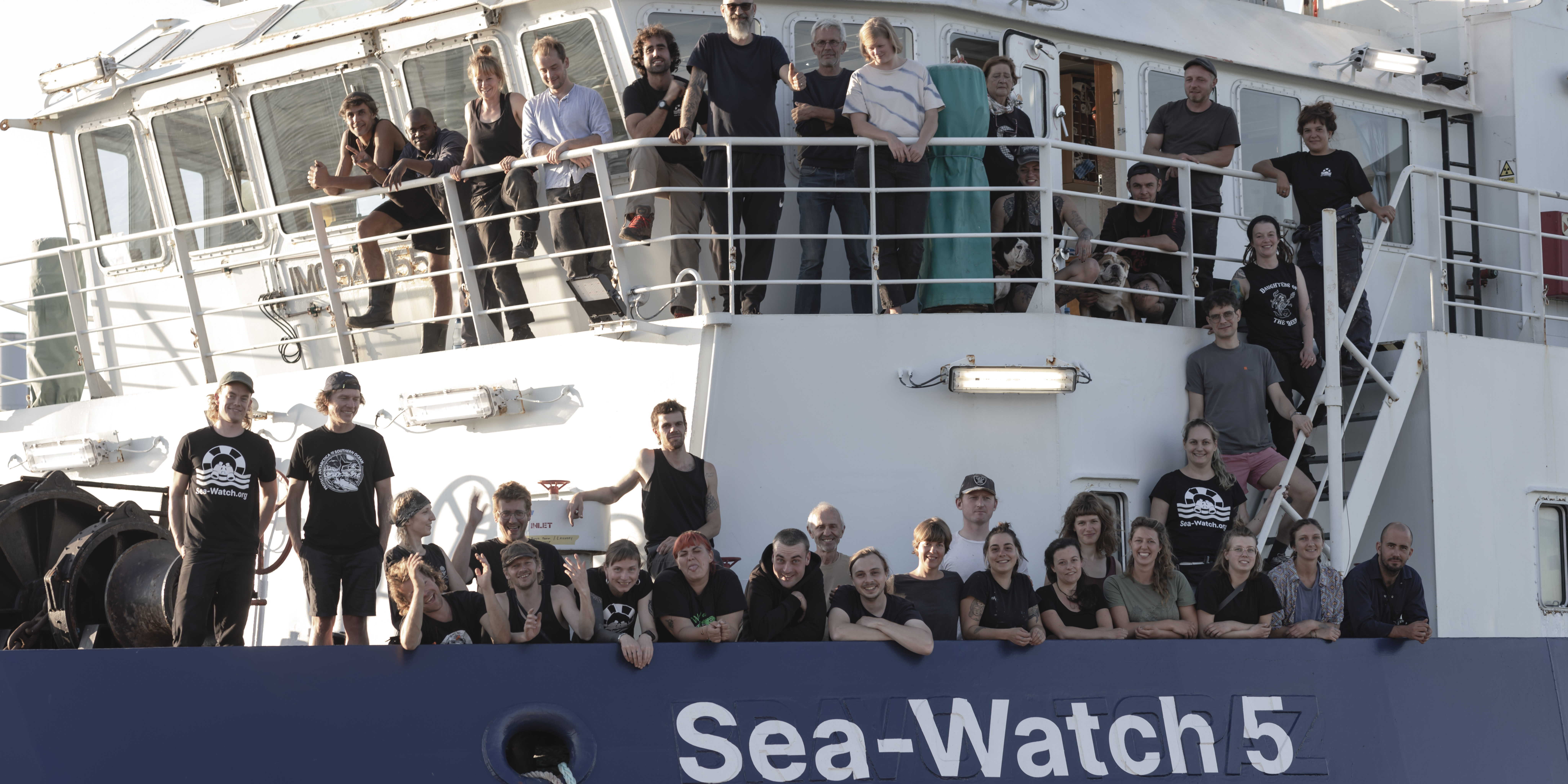Fra is the Project Coordinator of the Sea-Watch 5. Together with our Guest Care Coordinator Lorenz and a large, multidisciplinary team, they have spent the last few months converting the Sea-Watch 5 into a rescue ship. I spoke with them about the recent shipyard period and the exciting weeks ahead.
The time for the Sea-Watch 5 in the Flensburg shipyard is coming to an end. In addition to the reconstruction work, you had many other things on your plates.
Fra: Absolutely! In August, for example, the so-called evacuation drill took place. The Sea-Watch 5 sails under the German flag. This means that we are subject to specific requirements in order to be permitted to sail as a rescue ship. The drill simulates an emergency in which all people have to be evacuated from the ship and directed to life rafts. For the future operational crew, it was an opportunity to simulate an exceptional situation. For the drill, 350 volunteers came on board and had to be evacuated. So it was more than just an official exercise, it was also an educational and training opportunity for our crowd management. On the day of the big drill, we were all pretty nervous. After all, we didn’t know if enough people would really answer our call to participate in the exercise. But actually, it worked out! Considering that it was on a Tuesday and the ship was docked in Flensburg, this was definitely not a given! We were overwhelmed by how many Sea-Watch supporters were willing to make the journey. Thanks to them, we have come a big step closer to our goal of saving people from drowning with the Sea-Watch 5.
The Sea-Watch 5 is not only faster and bigger than her predecessors, but she will also offer our guests a number of amenities that will have a lasting effect on the general atmosphere on the ship.
Fra: Making our guests’ stay on board as pleasant as possible was the common thread running through Sea-Watch 5‘s reconstruction. In order to make this possible, we also had to take into account the characteristics of the ship: The engine, for instance. A moving ship of this size generates very loud vibrations and a lot of noise. We were able to reduce this by using so-called engine mounts. By additionally insulating the floor and walls, we were also able to successfully reduce noise in the hangar, where the most vulnerable guests will be during future operations. Our rescue operations can last up to 5 weeks. The crew and guests are in a constant state of emergency. The fact that we were able to reduce the noise so effectively is already an achievement that makes us very satisfied!
Lorenz: The whole ship is a huge improvement! For my team, which takes care of the guests on board, the rice kitchen will make the biggest difference. We are now able – no matter how many people we rescue – to make enough food for everyone on board. We can cook rice for 400 people in one cooking session. The added storage space allows us to cook delicious meals for the guests as well. We can adapt more to their needs, by varying spices, for example. All of this will have a huge impact on the mood on board – and that’s a priority for the Guest Care Team! After all, a good mood on board is the basis for us to be able to get through longer waiting times for ports.
Another improvement is our tea corner. A warm cup of tea, which we can offer to our guests at any time, can make a big difference in critical situations such as immediately after a rescue or during what feels like endless waiting times and can rekindle hope. It also prevents dehydration.
How many people are still on the Sea-Watch 5? What still needs to be done?
Fra: Currently there are around 40 people on board the Sea-Watch 5, divided into the Operations Crew and the Shipyard Crew. After months of work, however, I can now say that we are on the final stretch. In the hospital, for example, our medics are already putting the medicine away. What a satisfaction for our crew to know that all the hard work has paid off, and the ship will soon be in the Mediterranean!
Lorenz: I’m currently preparing for my first deployment with the new ship. For years, I have been asking myself the same questions over and over again. How can we help everyone? Can we even help everyone? And what can we do to be able to help everyone again? Ships are regularly detained by the Italian authorities, as is currently the case with the AURORA, the little sister of the Sea-Watch 5. We have now converted a ship by investing a lot of time and energy and thanks to our donors’ support. Of course, I also ask myself how long it will take until this ship falls victim to this arbitrary isolation policy and is detained. This scares us, and on the other hand, it is definitely time to get going again. We remain optimistic and fierce! For we are needed, and therefore giving up is not an option!











